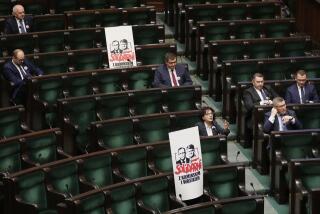Polish Firebrand Loses His Immunity
- Share via
WARSAW — Polish lawmakers stripped outspoken anti-establishment politician Andrzej Lepper of parliamentary immunity Friday, opening the door to his prosecution on slander charges and a possible prison term of up to two years.
The leader of Self-Defense, a farmers union and populist party that holds the third-largest number of seats in Parliament, Lepper is seen by some Poles as a hero who combats corruption and the sellout of Polish national interests. Others view him as a threat to democracy.
Lepper argues that the effort to prosecute him on slander charges itself threatens democracy.
Lawmakers voted overwhelmingly against Lepper. The outcome means that he may be tried for alleging in a fiery speech in November that five prominent politicians had taken bribes. Lepper phrased his most explosive charges as questions, but that has not prevented legal action against him.
In two speeches to the lower house of Parliament, or Sejm, on Friday, Lepper repeated his allegations in broader terms.
“You have been robbing this country for 12 years,” Lepper told his colleagues over a loudspeaker system brought into Parliament by his party after the legislative leadership cut off the official microphone. “This is the truth society is going to hear. I’m ashamed of you.”
“There will be no anarchy in the Sejm, and Lepper will not rule here,” Parliament Speaker Marek Borowski declared in the midst of the chaos.
Friday evening, Lepper was allowed to give a speech that lasted more than two hours, prompting comparison on the private TVN television network to the marathon speeches for which Cuban President Fidel Castro is famous.
Lepper said he was not sorry for what he said in November.
“I am saying that Poland’s national wealth is being robbed,” he stressed. “We can all see it.”
He also blasted former Deputy Prime Minister Leszek Balcerowicz, widely credited as the architect of Poland’s post-Communist market-oriented economic reforms, who is now president of the country’s central bank. Lepper said Self-Defense will ask an international tribunal to charge Balcerowicz with “genocide” for creating economic conditions under which families decide not to have more children.
Despite the growing backlash from other politicians, Lepper retains great ambitions.
“We do not hide the fact that we want to take over power and will do everything in order to rule Poland,” he said in a recent interview.
With unemployment at 17% and economic growth falling to just 1% last year compared with 4% in 2000, some of those who have suffered during the transition to capitalism find appeal in Lepper’s tough talk. In a December survey by OBOP, a major polling agency, 39% of respondents said Lepper acts for the “good” of democracy.
In his November speech, Lepper said his suspicions of bribery were based on information from a farm manager named Bogdan Gasinski.
Days later, Gasinski, who has been accused of financial misconduct, discredited himself in the eyes of investigators and the Polish public with a fantastic laundry list of additional allegations. He claimed that the Taliban had been experimenting with anthrax on the farm he had managed and that politicians were involved in smuggling drugs from Afghanistan that were disguised as shipments of gems.
Borowski, the Parliament speaker, ridiculed Lepper’s speech Friday by referring to those claims.
“I am tired and deeply disappointed, because last time it all led to the Taliban [and] anthrax. . . . Those were interesting matters,” Borowski said.
“Andrzej Lepper uses the following method,” Borowski added. “He says something, humiliates someone and then says, ‘Prove that this is not true.’ It is Andrzej Lepper who should prove that this is true.”
Citing an old Polish saying, Borowski added that “the person he is pointing to should not have to prove he is not a camel.”
Wieslaw Walendziak, a member of Parliament from the Law and Justice party, said people should not be too concerned about either Lepper or the chaos in Parliament.
“Lepper is a problem of the Polish Parliament but not as some say of Polish democracy,” Walendziak said. “It’s the majority that makes decisions. Such events happen also in mature democracies. Polish democracy will manage this problem. One of the charms of democracy is that we also have to live with such incidents.”
*
Times staff writer Holley reported from Bratislava, Slovakia, and special correspondent Kasprzycka from Warsaw.
More to Read
Sign up for Essential California
The most important California stories and recommendations in your inbox every morning.
You may occasionally receive promotional content from the Los Angeles Times.










